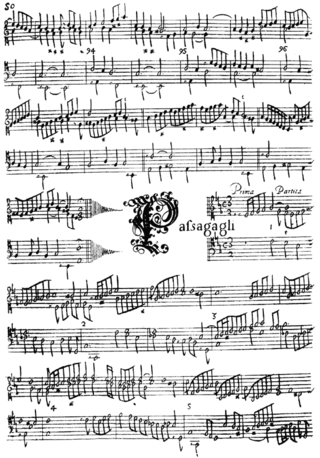
The passacaglia is a musical form that originated in early seventeenth-century Spain and is still used today by composers. It is usually of a serious character and is typically based on a bass-ostinato and written in triple metre.

William Elphinstone was a Scottish statesman, Bishop of Aberdeen and founder of the University of Aberdeen.

Girolamo Alessandro Frescobaldi was an Italian composer and virtuoso keyboard player. Born in the Duchy of Ferrara, he was one of the most important composers of keyboard music in the late Renaissance and early Baroque periods. A child prodigy, Frescobaldi studied under Luzzasco Luzzaschi in Ferrara, but was influenced by many composers, including Ascanio Mayone, Giovanni Maria Trabaci, and Claudio Merulo. Girolamo Frescobaldi was appointed organist of St. Peter's Basilica, a focal point of power for the Cappella Giulia, from 21 July 1608 until 1628 and again from 1634 until his death.

The Frescobaldi are a prominent Florentine noble family that have been involved in the political, social, and economic history of Tuscany since the Middle Ages. Originating in the Val di Pesa in the Chianti, they appear holding important posts in Florence in the twelfth century.
Johann Jakob Froberger was a German Baroque composer, keyboard virtuoso, and organist. Among the most famous composers of the era, he was influential in developing the musical form of the suite of dances in his keyboard works. His harpsichord pieces are highly idiomatic and programmatic.
Girolamo is an Italian variant of the name Hieronymus. Its English equivalent is Jerome.
William Scheves was the second Archbishop of St. Andrews. His parentage is obscure, but he was probably the illegitimate son of a royal clerk, John Scheves. Sixteenth-century accounts claim he spent several years abroad and studied at the University of Louvain. He spent several years at the University of St Andrews as an administrator. In his earlier ecclesiastical career, he had been clericus regiae and master of the hospital of Brechin. In 1474 he was provided unsuccessfully to the Archdeaconry of Dunblane, but by the beginning of 1477 he was Archdeacon of St Andrews and coadjutor (successor) and vicar-general of the archdiocese. After the deposition of Archbishop Patrick Graham in 1478, he succeeded to the archbishopric, apparently receiving the papal pall while in the presence of King James III and many of the nobility at Holyrood.

Italians in the United Kingdom, also known as Italian Brits are citizens and/or residents of the United Kingdom who are fully or partially of Italian descent, whose ancestors were Italians who emigrated to the United Kingdom during the Italian diaspora. The phrase may refer to someone born in the United Kingdom of Italian descent, someone who has emigrated from Italy to the United Kingdom, or someone born elsewhere, who is of Italian descent and has migrated to the UK. More specific terms used to describe Italians in the United Kingdom include: Italian English, Italian Scots, and Italian Welsh.
The 17th century organ composers of Germany can be divided into two primary schools: the north German school and the south German school. The stylistic differences were dictated not only by teacher-pupil traditions and international influences, but also by separate organ building traditions: northern organs tend to have a tower layout with emphasis on the pedal division, while southern and Austrian instruments are typically divided around a window and emphasize manual divisions.

Fiori musicali is a collection of liturgical organ music by Girolamo Frescobaldi, first published in 1635. It contains three organ masses and two secular capriccios. Generally acknowledged as one of Frescobaldi's greatest works, Fiori musicali influenced composers during at least two centuries. Johann Sebastian Bach was among its admirers, and parts of it were included in the celebrated Gradus ad parnassum, a highly influential 1725 treatise by Johann Joseph Fux which was in use even in the 19th century.

Ornellaia is an Italian wine producer in the DOC Bolgheri in Toscana, known as a producer of Super Tuscan wine. Ornellaia is considered one of Italy's leading Bordeaux-style red wines. The estate also produces a second wine, Le Serre Nuove, the blend Le Volte, the Merlot-labeled varietal wine Masseto, in addition to estate production of grappa and olive oil. In 2012, the winery's name was changed from "Tenuta dell'Ornellaia" to "Ornellaia e Masseto", in recognition of the increasing importance of the Merlot-based wine.
Ercole Pasquini was an Italian composer and organist.

Frescobaldi is an editor for LilyPond music files. It aims to be powerful, yet lightweight and easy to use. Frescobaldi is free software, freely available under the GNU General Public License. It is designed to run on all major operating systems. It is named after Girolamo Frescobaldi, an Italian composer of keyboard music in the late Renaissance and early Baroque period.
Marchesini is a surname. Notable people with the surname include:
Andrew Halyburton or Haliburton was a Scottish merchant.
Jerome, Hieronimo, or Girolamo Frescobaldi (1444–1517) was an Italian financier and textile merchant based in Bruges. He supplied luxury goods to the Scottish court and was described as a "very good friend to the King of Scots". The Frescobaldi family and company, based in Florence, were involved in artistic commissions in England and Scotland. Jerome Frescobaldi was involved in the wool trade with Tommaso Portinari and his sons, and marketed spices obtained by Portuguese traders.
Guglielmo Manzi was an Italian classicist and librarian of what was then the Biblioteca Barberiniana.

Leonardo Frescobaldi (1485–1529) was an Italian merchant based in England at the court of Henry VIII.
This page is based on this
Wikipedia article Text is available under the
CC BY-SA 4.0 license; additional terms may apply.
Images, videos and audio are available under their respective licenses.







